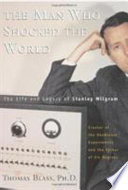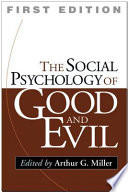 | Peter Hayes, Holocaust Educational Foundation - 1991 - 258 pages
.... . . After witnessing hundreds of ordinary persons submit to the authority in our own experiments, I must conclude that Arendt's conception of the "banality...evil" comes closer to the truth than one might dare imagine.13 A crucial factor in Milgram's analysis of obedience is a socialization theory that makes... | |
 | Gerald E. Markle - 1995 - 202 pages
...culture did indeed commit the most heinous crimes. Milgram's evaluation of Arendt's thesis is pertinent: "I must conclude that Arendt's conception of the 'banality...closer to the truth than one might dare imagine." 67 For me, it is useful (though not necessarily true) to think of Nazi evil—perhaps all evil—as... | |
 | M. A. P. Bovens - 1998 - 268 pages
...unequivocal: After witnessing hundreds of ordinary people submit to the authority in our own experiments, I must conclude that Arendt's conception of the banality of evil comes closer to the truth than anyone might dare imagine. The ordinary person who shocked the victim [with electricity] did so out... | |
 | Leonard S. Newman, Ralph Erber - 2002 - 382 pages
...to the authority in our own experiments, 1 must conclude thai Arendt's conception oi the banality oi evil comes closer to the truth than one might dare...ordinary person who shocked the victim did so out ol a sense ol obligation, a conception oi his duties as a subject and not irom any peculiarly aggressive... | |
 | Omer Bartov - 2003 - 278 pages
...ordinary people drawn from working, managerial, and professional classes" (my italics), he concludes "that Arendt's conception of the banality of evil...conception of his duties as a subject — and not from any peculiarly aggressive tendencies." Hence, he writes, "the most fundamental lesson of our study" is... | |
 | Thomas Blass - 2004 - 400 pages
...job. . . . After witnessing hundreds of ordinary people submit to the authority m our own experiments, I must conclude that Arendt's conception of the banality...conception of" his duties as a subject — and not from any peculiarly aggressive tendencies. This is, perhaps, the most fundamental lesson of our study: ordinary... | |
 | Arthur G. Miller - 2005 - 516 pages
...findings: After witnessing hundreds of ordinary people submit to the authority in our own experiments, I must conclude that Arendt's conception of the banality...might dare imagine. The ordinary person who shocked his victim did so out of a sense of obligation . . . and not from any peculiarly aggressive tendencies.... | |
 | Elisabeth Young-Bruehl - 2004 - 638 pages
...suggested: "After witnessing hundreds of ordinary people submit to authority in our own experiments, I must conclude that Arendt's conception of the banality...comes closer to the truth than one might dare imagine. . . . This is, perhaps, the most fundamental lesson of our study: ordinary people, simply doing their... | |
 | Mona Sue Weissmark - 2004 - 216 pages
...legitimate authority. Moreover, an ordinary person who becomes an agent in a destructive process does so out of a sense of obligation — a conception of his duties — and not from any aggressive, immoral tendencies. Milgram's study clearly showed that individuals... | |
| |